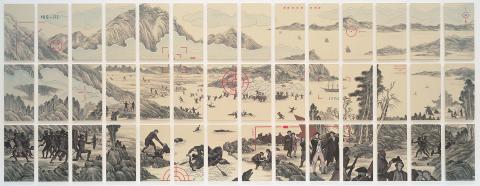GUAN Wei; Echo
Guan Wei draws on both his Chinese heritage and his contemporary experience of Australia, his adopted homeland. In Echo, Guan Wei has appropriated Jiu Ri Shi Cheng Tu Juan, a landscape painting by Wang Yuanqi (1641-1715), regarded as the highest aesthetic achievement of seventeenth and eighteenth-century China. Guan Wei juxtaposes this with an equivalent aesthetic achievement from Europe of the same period: history painting, which was the pinnacle of the hierarchy of painting genres. In particular he quotes a later Australian example, Landing of Captain Cook at Botany Bay, 1770 1902 by E Phillips Fox, as well as images of European exploration of the Pacific Ocean from early books on the subject. In doing so, Guan Wei implies a comparison between China and Europe: the former drew in on itself, becoming culturally introspective, while the latter aggressively expanded, absorbing and destroying other cultures. He states that:
'The aesthetic value of such a famous Chinese intellectual painting is the harmony between nature and humankind, as well as the abstract expression of the individual's spiritual pursuits. However, when Captain Cook and his soldiers emerge from the wild seascape into such harmony, their courage and ambitious heroism is immediately swallowed and diminished. In fact, in such a scene, these historical European heroes become more like a group of brutal bandits.'
With the artist's quotation of various historical sources, both Chinese and Australian, Echo is therefore a contemporary history painting about some of the most complex and troubling issues of the present: migration, conquest, reconciliation, even Australia's status as a refuge. Its title suggests that the past continues to impact on the present but will, with time, diminish like a fading echo, allowing new voices to resonate into the future.
